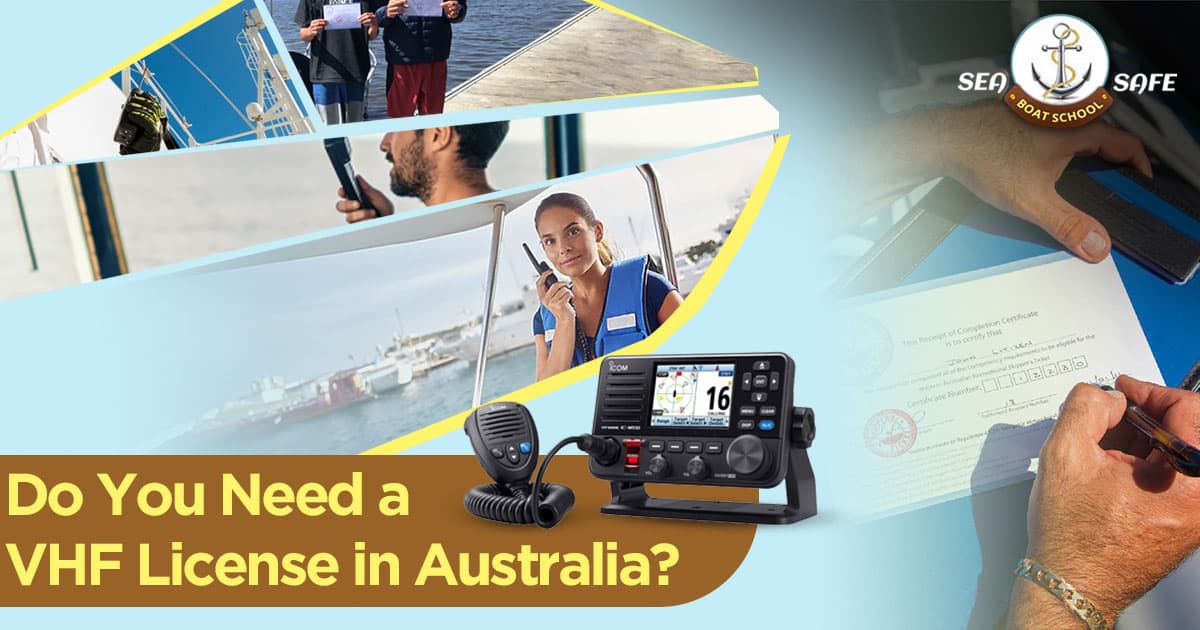Like Our Page :
Sea Safe Boat School
Arran
0429 146 201
Like Our Page :
Sea Safe Boat School
Arran
0429 146 201

If you’re planning to head out on the water in Australia, understanding the rules around using a VHF marine radio is crucial. Operating a VHF radio without a valid license is illegal, and having the right qualifications can make a significant difference in your safety and compliance.
This article will explain why you need a VHF license and how to obtain one.
VHF (Very High Frequency) marine radios are essential tools for communication at sea. They allow boat operators to talk to each other, receive important weather updates, and contact emergency services if needed.
Given their importance, the Australian Maritime Safety Authority (AMSA) requires that all VHF radio operators hold a Certificate of Proficiency. This ensures that you know how to use the radio correctly and understand the legal responsibilities that come with it.
In Australia, there are two main types of certificates you can obtain for operating a VHF radio:
The Australian Waters Qualification (AWQ) is aimed at recreational boaters. This certificate allows you to operate a VHF radio within 12 nautical miles of the shore.
If you’re someone who enjoys fishing or cruising close to the coast, this qualification is perfect for you. The AWQ training course covers important topics, including:
By completing the AWQ course, you’ll gain confidence in your ability to handle communication equipment while ensuring you comply with the law.
If you plan to venture further out to sea—beyond 12 nautical miles—or if you’ll be involved in overseas charter operations, you will need the Short Range Operator Certificate of Proficiency (SROCP). This certification is more comprehensive and requires a deeper understanding of radio operation and maritime regulations.
The SROCP course includes:
Obtaining the SROCP not only makes you a more skilled operator but also helps you navigate safely in a variety of situations.
To acquire either the AWQ or SROCP, you must complete a recognised training course. These courses are offered by various providers across Australia and typically include:
Most courses are designed to be accessible to everyone, regardless of previous experience. Completing one of these courses is a wise investment in your safety and confidence while boating.
While you don’t need an individual license to operate a 27 MHz radio, it’s still a good idea to obtain a proficiency certificate. Even though it’s not mandatory, having this knowledge can improve your safety and help you comply with regulations, creating a safer boating environment for everyone.
Boating in Australia can be an exhilarating experience, but with that excitement comes the responsibility of ensuring your safety and the safety of others. Obtaining a VHF license—whether it’s the Australian Waters Qualification (AWQ) or the Short Range Operator Certificate of Proficiency (SROCP)—is essential for operating a VHF marine radio legally and effectively.
By obtaining your marine VHF licence with Sea Safe Boat School, you’ll not only comply with the law but also acquire essential skills for handling emergencies and communicating effectively on the water. Whether you’re a casual boater or planning longer journeys, having this licence is an important step towards ensuring your safety and the safety of those around you.
If you’re ready to start your journey towards becoming a licensed VHF operator, contact us for a free consultation to explore recognised training providers like the Australian Maritime Safety Authority for more information on courses and certification options. Don’t take unnecessary risks; get your VHF licence and enjoy your time on the water with peace of mind!

Mike Watson, chef instructor of Sea Safe Boat School, has over 35 years of sea-going experience. Starting his maritime journey at 15 in Grimsby, England, he's sailed locations like Iceland and Greenland. Certified as a Master-5 Trainer, Mike is now dedicated to offering courses to those pursuing their recreational skippers ticket in Perth.
Copyright all rights reserved © Sea Safe Boat School. Website by Selling Online Made Simple. Sitemap.